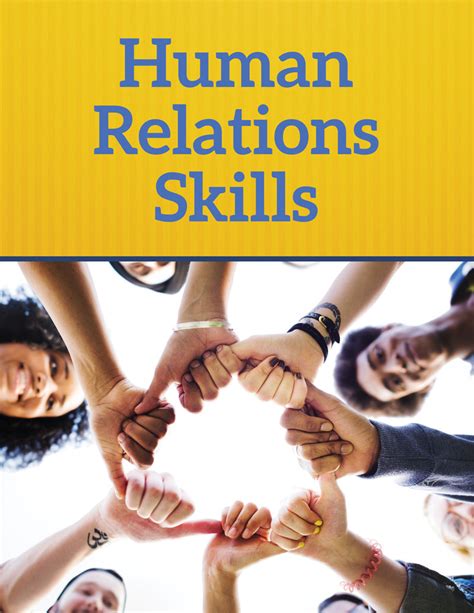Exploring Human Relations Skills

Human relations skills are essential for effective communication and building positive relationships with others. Whether in the workplace, personal life, or social interactions, these skills play a crucial role in understanding and connecting with people on a deeper level. In this blog post, we will explore the importance of human relations skills and provide practical tips for developing and improving these skills.
Understanding Human Relations Skills
Human relations skills, also known as interpersonal skills, refer to the ability to interact and communicate effectively with others. These skills involve understanding and managing emotions, resolving conflicts, building trust, and fostering positive relationships. They are vital in various areas of life, including personal relationships, teamwork, leadership, customer service, and networking.
Importance of Human Relations Skills in the Workplace
In the workplace, human relations skills are crucial for creating a positive work environment, enhancing teamwork, and improving productivity. Here are some key reasons why these skills are important:
- Effective Communication: Good human relations skills enable clear and efficient communication, leading to better understanding and collaboration among team members.
- Conflict Resolution: With strong human relations skills, individuals can resolve conflicts and disagreements amicably, reducing tension and promoting a harmonious work environment.
- Teamwork and Collaboration: Human relations skills facilitate effective teamwork by fostering trust, empathy, and cooperation among team members.
- Leadership Ability: Leaders with strong human relations skills can inspire and motivate their team members, leading to higher employee engagement and productivity.
- Customer Service: Interpersonal skills are crucial in customer service roles, as they help build rapport, understand customer needs, and provide excellent service.
Developing Human Relations Skills
Fortunately, human relations skills can be developed and improved with practice and self-awareness. Here are some tips to enhance your interpersonal skills:
- Active Listening: Practice active listening by giving your full attention to the speaker, maintaining eye contact, and showing genuine interest in what they have to say.
- Empathy: Put yourself in others’ shoes and try to understand their perspectives and emotions. Show empathy by acknowledging their feelings and validating their experiences.
- Effective Communication: Improve your communication skills by expressing yourself clearly, using non-verbal cues effectively, and being mindful of your tone and body language.
- Conflict Resolution: Learn and practice conflict resolution strategies, such as active listening, finding common ground, and seeking win-win solutions.
- Building Trust: Foster trust by being reliable, keeping your commitments, and maintaining confidentiality when needed.
- Emotional Intelligence: Develop emotional intelligence by understanding and managing your own emotions, as well as recognizing and responding to the emotions of others.
- Adaptability: Be open to change and flexible in your interactions with others. Adapt your communication style to suit different situations and individuals.
- Respect and Diversity: Embrace diversity and treat others with respect, regardless of their background, beliefs, or opinions.
- Conflict Resolution: Learn and practice conflict resolution strategies, such as active listening, finding common ground, and seeking win-win solutions.
- Continuous Learning: Seek opportunities for personal and professional growth, such as attending workshops, reading books on interpersonal skills, or seeking feedback from others.
The Role of Emotional Intelligence in Human Relations
Emotional intelligence (EI) is a crucial component of human relations skills. It refers to the ability to recognize, understand, and manage one’s own emotions, as well as the emotions of others. EI plays a significant role in building strong relationships, resolving conflicts, and effective communication. By developing emotional intelligence, individuals can enhance their human relations skills and create more meaningful connections with others.
Case Study: The Role of Emotional Intelligence in Leadership
John Smith, the CEO of ABC Company, is known for his exceptional leadership skills and ability to connect with his employees. Through his high emotional intelligence, he understands the needs and concerns of his team members, listens to their feedback, and provides support when needed. As a result, the company has a positive work culture, high employee satisfaction, and increased productivity.
Conclusion
Human relations skills are essential for effective communication, building positive relationships, and achieving success in various areas of life. By developing and improving these skills, individuals can enhance their personal and professional interactions, leading to greater satisfaction and success. Remember, human relations skills are not only important in the workplace but also in personal relationships and social interactions. Continuously working on these skills can bring immense benefits and contribute to a happier and more fulfilling life.
Frequently Asked Questions (FAQs)
- What are some examples of human relations skills?
- How can I improve my human relations skills?
- Why are human relations skills important in the workplace?
Examples of human relations skills include active listening, empathy, effective communication, conflict resolution, building trust, emotional intelligence, adaptability, and respect for diversity.
To improve your human relations skills, you can practice active listening, develop empathy, enhance your communication skills, learn conflict resolution strategies, build trust, develop emotional intelligence, be adaptable, respect diversity, and continue learning and growing.
Human relations skills are important in the workplace as they contribute to effective communication, conflict resolution, teamwork, leadership, and customer service. They create a positive work environment and improve productivity.
